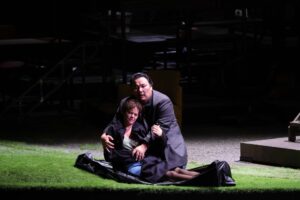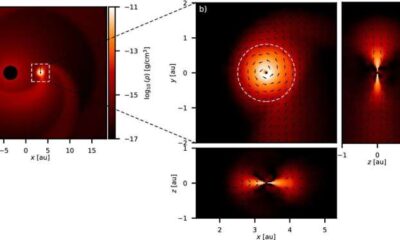Entertainment
Teatro alla Scala Revives Rigoletto with Bold New Vision

The Teatro alla Scala in Milan has announced a revival of its contemporary production of Verdi’s classic opera, “Rigoletto,” for the 2025 season. Originally staged by Mario Martone in 2022, this interpretation diverges significantly from traditional versions, bringing a modern and provocative twist to the timeless narrative.
Martone’s approach presents a more violent depiction of the story. The opening scene has been reimagined from a controversial orgy to a lavish party at a minimalist mansion, reflecting the excesses of the wealthy elite. Guests, dressed elegantly in costumes designed by Ursula Patzak, indulge in alcohol and cocaine, contrasting sharply with the starkly dressed paramedics and the impoverished neighborhood surrounding Rigoletto and Gilda.
The set design, crafted by Margherita Palli, plays a pivotal role in this vision. The Duke’s opulent home is juxtaposed against Rigoletto’s bleak environment, effectively highlighting the divide between social classes. A rotating stage, real rain effects during the storm in Act IV, and carefully designed lighting by Pasquale Mari contribute to a visually striking backdrop.
One of the most contentious aspects of Martone’s production is the alteration of the opera’s ending. After Rigoletto’s famous line, “Ah, la maledizione!” a gang invades the Duke’s residence, resulting in a bloody conclusion that starkly contrasts Verdi’s original tragic essence. This interpretation has sparked debate regarding the integrity of the source material, with critics arguing that it undermines the moral core of the opera and Gilda’s tragic sacrifice.
In program notes, Martone cites inspiration from the Oscar-winning film “Parasite,” aiming to depict an explosion of violence as a metaphor for societal rebellion. He positions Monterone and Rigoletto as marginalized figures, embodying resistance against power structures. Critics, however, argue that this contemporary reading strays too far from Verdi’s intended pessimism, where tragedy prevails without hope for justice.
Musically, the production garnered praise for its interpretation. Marco Armiliato, a renowned conductor, led the orchestra with precision, balancing the dynamics effectively throughout the performance. The Teatro alla Scala Orchestra displayed vigor and energy, although some moments revealed minor inaccuracies. Armiliato’s interpretation highlighted often-overlooked passages, enriching the auditory experience.
In the title role, Amartuvshin Enkhbat reprised his performance from the previous season. While his vocal skills were commendable, his stage presence lacked the emotional depth required for such a complex character. Enkhbat’s execution of the iconic arias showcased his technical prowess, yet his overall performance remained somewhat detached, limiting the audience’s connection to Rigoletto’s plight.
Regula Mühlemann performed Gilda with a clear and youthful timbre, enhancing her character’s tragic arc. Her refined singing and dynamic control were notable, although slight weaknesses in her upper register occasionally detracted from her overall impact. Nonetheless, her delivery in pieces like “Caro nome che il mio cor” was particularly impressive.
Replacing tenor Dmitry Korchak, Galeano Salas stepped in shortly before the premiere, successfully portraying the Duke of Mantua. His warm voice and nuanced performance provided a compelling interpretation, transitioning effectively from frivolity to cynicism. Salas’s rendition of “La donna è mobile” received moderate applause, but his performance of “Parmi veder le lagrime” stood out for its elegance and style.
The supporting cast also delivered strong performances. Gianluca Buratto made a powerful impression as Sparafucile, while Martina Belli brought a seductive quality to Maddalena. Fabrizio Beggi as Monterone effectively intensified the dramatic atmosphere, showcasing the potential of the production’s visual elements.
Overall, the secondary roles contributed positively to the performance, with commendable portrayals from Carlotta Vichi, Wonjun Jo, Pierluigi D’Aloia, and Xhieldo Hyseni. As the performance concluded, the audience, primarily composed of tourists, responded with warm but measured applause, reflecting the high expectations surrounding this much-anticipated revival.
Teatro alla Scala’s new vision for “Rigoletto” offers a contemporary lens on a classic opera, inviting audiences to engage with its themes of violence and social disparity, albeit at the risk of straying from the original’s tragic foundation.
-

 Science2 months ago
Science2 months agoOhio State Study Uncovers Brain Connectivity and Function Links
-

 Politics2 months ago
Politics2 months agoHamas Chief Stresses Disarmament Tied to Occupation’s End
-

 Science1 month ago
Science1 month agoUniversity of Hawaiʻi Joins $25.6M AI Project for Disaster Monitoring
-

 Science4 weeks ago
Science4 weeks agoALMA Discovers Companion Orbiting Giant Star π 1 Gruis
-

 Entertainment2 months ago
Entertainment2 months agoMegan Thee Stallion Exposes Alleged Online Attack by Bots
-

 Science2 months ago
Science2 months agoResearchers Challenge 200-Year-Old Physics Principle with Atomic Engines
-

 Entertainment2 months ago
Entertainment2 months agoPaloma Elsesser Shines at LA Event with Iconic Slicked-Back Bun
-

 World1 month ago
World1 month agoFDA Unveils Plan to Cut Drug Prices and Boost Biosimilars
-

 Business2 months ago
Business2 months agoMotley Fool Wealth Management Reduces Medtronic Holdings by 14.7%
-

 Science2 months ago
Science2 months agoInnovator Captures Light at 2 Billion Frames Per Second
-

 Top Stories2 months ago
Top Stories2 months agoFederal Agents Detain Driver in Addison; Protests Erupt Immediately
-

 Entertainment1 month ago
Entertainment1 month agoBeloved Artist and Community Leader Gloria Rosencrants Passes Away









